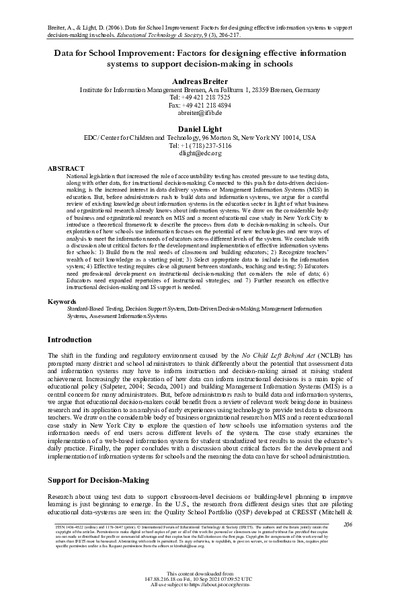Data for School ImprovementFactors for designing effective information systems to support decision-making in schools
Andreas Breiter, Daniel Light
Erstpublikation in: . Educational Technology & Society, 9 (3), 206-217.
Publikationsdatum:
|
 |
 Diese Seite wurde seit 2 Jahren inhaltlich nicht mehr aktualisiert.
Unter Umständen ist sie nicht mehr aktuell.
Diese Seite wurde seit 2 Jahren inhaltlich nicht mehr aktualisiert.
Unter Umständen ist sie nicht mehr aktuell.
 Zusammenfassungen
Zusammenfassungen
 National legislation that increased the role of accountability testing has created pressure to use testing data,
along with other data, for instructional decision-making. Connected to this push for data-driven decisionmaking, is the increased interest in data delivery systems or Management Information Systems (MIS) in
education. But, before administrators rush to build data and information systems, we argue for a careful
review of existing knowledge about information systems in the education sector in light of what business
and organizational research already knows about information systems. We draw on the considerable body
of business and organizational research on MIS and a recent educational case study in New York City to
introduce a theoretical framework to describe the process from data to decision-making in schools. Our
exploration of how schools use information focuses on the potential of new technologies and new ways of
analysis to meet the information needs of educators across different levels of the system. We conclude with
a discussion about critical factors for the development and implementation of effective information systems
for schools: 1) Build from the real needs of classroom and building educators; 2) Recognize teachers’
wealth of tacit knowledge as a starting point; 3) Select appropriate data to include in the information
system; 4) Effective testing requires close alignment between standards, teaching and testing; 5) Educators
need professional development on instructional decision-making that considers the role of data; 6)
Educators need expanded repertoires of instructional strategies; and 7) Further research on effective
instructional decision-making and IS support is needed.
National legislation that increased the role of accountability testing has created pressure to use testing data,
along with other data, for instructional decision-making. Connected to this push for data-driven decisionmaking, is the increased interest in data delivery systems or Management Information Systems (MIS) in
education. But, before administrators rush to build data and information systems, we argue for a careful
review of existing knowledge about information systems in the education sector in light of what business
and organizational research already knows about information systems. We draw on the considerable body
of business and organizational research on MIS and a recent educational case study in New York City to
introduce a theoretical framework to describe the process from data to decision-making in schools. Our
exploration of how schools use information focuses on the potential of new technologies and new ways of
analysis to meet the information needs of educators across different levels of the system. We conclude with
a discussion about critical factors for the development and implementation of effective information systems
for schools: 1) Build from the real needs of classroom and building educators; 2) Recognize teachers’
wealth of tacit knowledge as a starting point; 3) Select appropriate data to include in the information
system; 4) Effective testing requires close alignment between standards, teaching and testing; 5) Educators
need professional development on instructional decision-making that considers the role of data; 6)
Educators need expanded repertoires of instructional strategies; and 7) Further research on effective
instructional decision-making and IS support is needed. Dieser wissenschaftliche Zeitschriftenartikel erwähnt ...
Dieser wissenschaftliche Zeitschriftenartikel erwähnt ...
 Personen KB IB clear | John Seely Brown , Ikujiro Nonaka , Michael Polanyi , Hirotaka Takeuchi , Franz E. Weinert | |||||||||||||||||||||||||||||||||||||||||||||
 Begriffe KB IB clear |  Daten Daten data
, data
,  learning analytics learning analytics learning analytics
, learning analytics
,  Lernen Lernen learning learning
| |||||||||||||||||||||||||||||||||||||||||||||
 Bücher |
|
 Zitationsgraph
Zitationsgraph
 Zitationsgraph (Beta-Test mit vis.js)
Zitationsgraph (Beta-Test mit vis.js)
 4 Erwähnungen
4 Erwähnungen 
- Datafying education - How digital assessment practices reconfigure the organisation of learning (Juliane Jarke, Andreas Breiter) (2005)


- Handbook of Research on Educational Communications and Technology - 4th edition (J. Michael Spector, M. David Merrill, Jan Elen, M. J. Bishop) (2014)
- 27. Data-Driven Decision Making in the K-12 Classroom (Trent E. Kaufman, Charles R. Graham, Anthony G. Picciano, J. Aaron Popham, David A. Wiley)


- 27. Data-Driven Decision Making in the K-12 Classroom (Trent E. Kaufman, Charles R. Graham, Anthony G. Picciano, J. Aaron Popham, David A. Wiley)
- Datengetriebene Schule - Forschungsperspektiven im Anschluss an den 27. Kongress der DGfE (Mandy Schiefner, Sandra Hofhues, Andreas Breiter) (2021)
- Die Schule als digitale Bewertungsfiguration? - Zur Soziomaterialität von Algorithmen und Daten (Juliane Jarke, Andreas Breiter)


- Die Schule als digitale Bewertungsfiguration? - Zur Soziomaterialität von Algorithmen und Daten (Juliane Jarke, Andreas Breiter)
- Datafizierung in der Bildung - Kritische Perspektiven auf digitale Vermessung in pädagogischen Kontexten (Mandy Schiefner, Sandra Hofhues, Andreas Breiter) (2023)


- All is data? - Ein (Schreib-)Gespräch unter Herausgeber:innen (Mandy Schiefner-Rohs, Sandra Hofhues, Andreas Breiter)

- All is data? - Ein (Schreib-)Gespräch unter Herausgeber:innen (Mandy Schiefner-Rohs, Sandra Hofhues, Andreas Breiter)
 Volltext dieses Dokuments
Volltext dieses Dokuments
 |  Data for School Improvement: Artikel als Volltext ( Data for School Improvement: Artikel als Volltext ( : :  , 330 kByte; , 330 kByte;  : :  ) ) |
 Anderswo suchen
Anderswo suchen 
 Beat und dieser wissenschaftliche Zeitschriftenartikel
Beat und dieser wissenschaftliche Zeitschriftenartikel
Beat hat Dieser wissenschaftliche Zeitschriftenartikel während seiner Zeit am Institut für Medien und Schule (IMS) ins Biblionetz aufgenommen. Beat besitzt kein physisches, aber ein digitales Exemplar. Eine digitale Version ist auf dem Internet verfügbar (s.o.). Aufgrund der wenigen Einträge im Biblionetz scheint er es nicht wirklich gelesen zu haben. Es gibt bisher auch nur wenige Objekte im Biblionetz, die dieses Werk zitieren.












 Biblionetz-History
Biblionetz-History